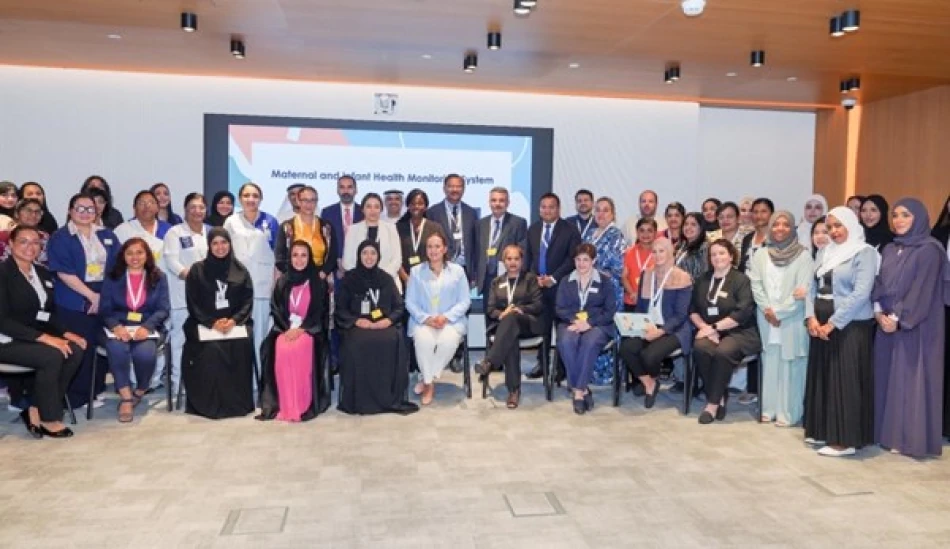
Abu Dhabi Honors 18 Hospitals for Exceptional Maternal and Newborn Care
Abu Dhabi Pioneers Comprehensive Maternal Health Tracking Program Across 18 Hospitals
Abu Dhabi has launched the UAE's first comprehensive maternal and newborn health monitoring program, marking a significant shift toward data-driven healthcare policy in the Gulf region. The initiative, now spanning 18 hospitals and involving over 3,400 mothers, represents a new model for preventive healthcare that could influence regional health strategies across the Middle East.
Beyond Clinical Data: A Holistic Approach to Maternal Care
The program, launched in 2023 through collaboration between the Abu Dhabi Early Childhood Authority, Abu Dhabi Public Health Centre, and Khalifa University, breaks new ground by integrating behavioral, social, economic, and clinical factors into a unified monitoring system. Unlike traditional healthcare tracking that focuses primarily on medical outcomes, this initiative captures mothers' lived experiences throughout pregnancy and postpartum periods.
Dr. Youssef Al Hammadi, Executive Director of Knowledge and Leadership at the Abu Dhabi Early Childhood Authority, emphasized that the program goes beyond conventional clinical data collection. "We listen to mothers, document their life experiences, and provide valuable insights into how pregnancy journeys affect maternal and child health," he explained, highlighting the program's patient-centered approach.
Strategic Health Intelligence for Policy Making
The initiative generates real-time data on critical health indicators including breastfeeding rates, nutrition patterns, mental health status, and birth weight outcomes. This comprehensive data collection enables healthcare authorities to identify and address social determinants that contribute to low birth weight and other adverse outcomes.
Dr. Rashid Obaid Al Suwaidi, Director General of the Abu Dhabi Public Health Centre, positioned the program as part of Abu Dhabi's commitment to building a world-class public health system focused on prevention. The real-time data capabilities allow for precise and equitable interventions based on immediate healthcare intelligence rather than retrospective analysis.
Rapid Expansion Demonstrates Program Success
The program's growth trajectory indicates strong institutional support and participant engagement. Starting with four hospitals in 2023—Corniche Hospital, Danat Al Emarat, Mediclinic Airport Road, and Zayed City Hospital—the initiative expanded to 18 facilities by mid-2025. The random selection process for participant recruitment ensures comprehensive community representation, strengthening the program's statistical validity.
Participating Healthcare Network
The expanded network now includes major healthcare providers such as Sheikh Shakhbout Medical City, Tawam Hospital, Cleveland Clinic Abu Dhabi (LLH), NMC Royal hospitals, Burjeel Medical City, and multiple Mediclinic facilities. This diverse hospital network spans public and private sectors, ensuring broad demographic coverage across Abu Dhabi emirate.
Regional Healthcare Innovation Model
Abu Dhabi's approach mirrors global trends toward preventive healthcare and data-driven policy making, similar to initiatives in Singapore's HealthHub program and aspects of the UK's National Health Service digital transformation. However, the emirate's focus on integrating social determinants with clinical outcomes positions it ahead of many regional healthcare systems.
The program's emphasis on evidence-based policy making aligns with the UAE's broader Vision 2071 goals and positions Abu Dhabi as a healthcare innovation hub in the Gulf Cooperation Council region. This could influence similar initiatives across neighboring emirates and countries seeking to modernize their maternal health services.
Implications for Future Healthcare Policy
With over 3,400 mothers already participating, the program is building a substantial database that will inform long-term health policy decisions. The focus on early intervention and targeted support based on real-time data could significantly improve maternal and child health outcomes while reducing healthcare costs through preventive measures.
This institutional collaboration model between the Early Childhood Authority and Public Health Centre demonstrates how cross-sector partnerships can drive healthcare innovation. The program's success may serve as a template for other health initiatives in the UAE and provide valuable insights for international maternal health programs seeking to integrate social and clinical factors in their monitoring systems.
Most Viewed News

 Layla Al Mansoori
Layla Al Mansoori






